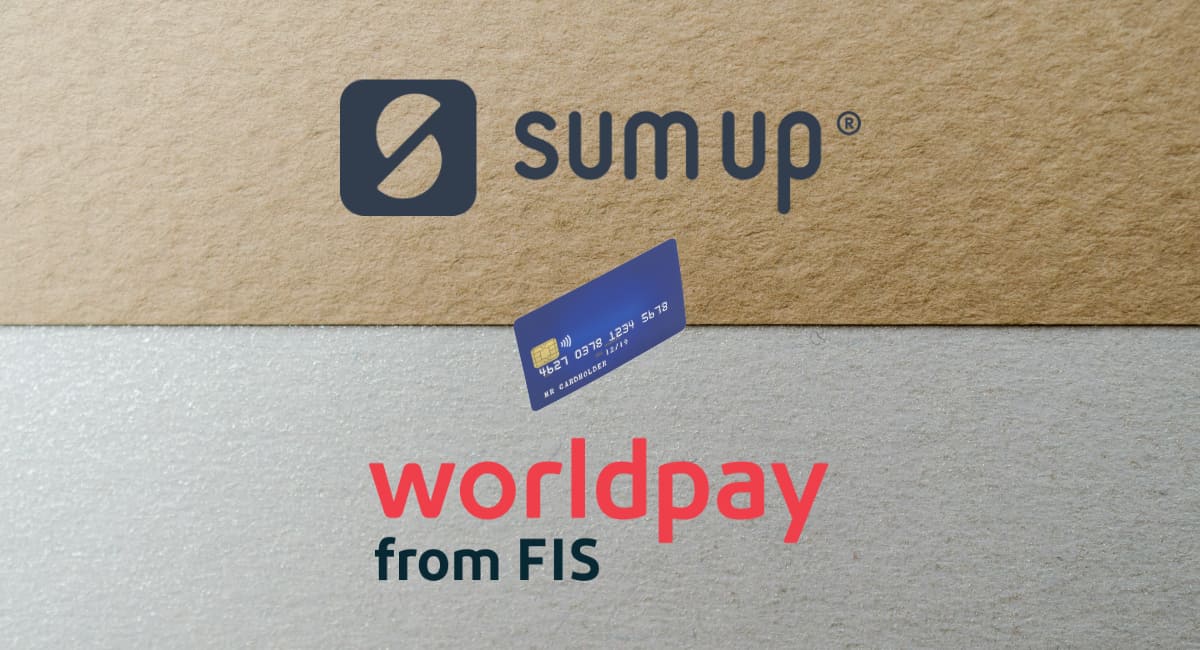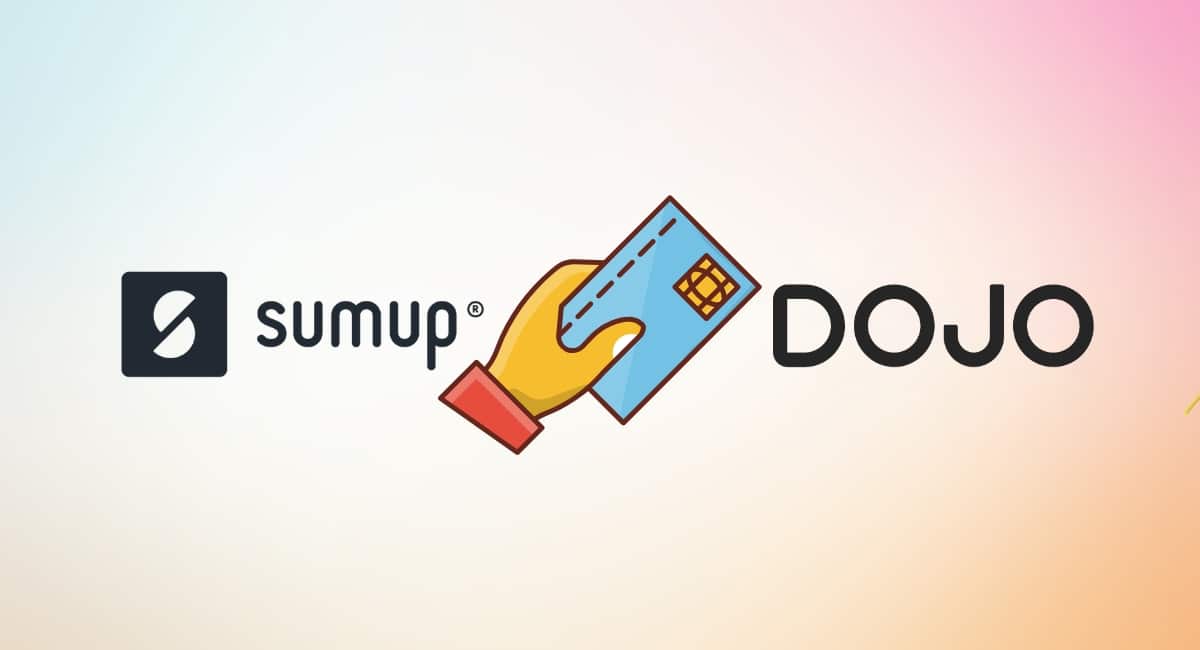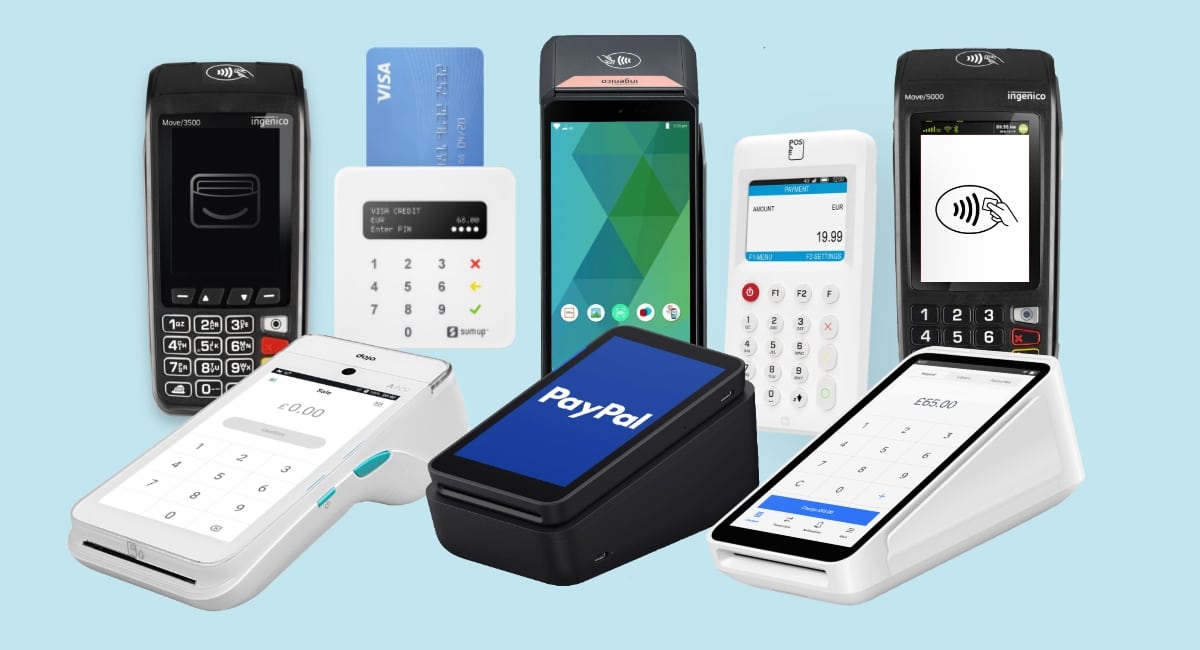SumUp and Worldpay are two very different companies, but they both have in common that they provide card machines.
Worldpay is a London-based, traditional payment company that’s been around for over 30 years, while SumUp is a newer platform, originally from Germany, that hasn’t yet rounded a decade.
Their card payment solutions, fees, contracts and ideal merchants are main differentiators – let’s see how.
 |
 |
|
|---|---|---|
| Best for | Any size business preferring contract with tailored fees & services | Small businesses preferring contract-free, cheap & easy payment solution |
| Lock-in | Yes, on all plans except for Pay As You Go | None |
| Fees | Custom | Very simple |
| Card machines | Rented or purchased | One-off cost |
| Remote payments | Any type offered, cost extra | Some offered, subject to activation |
| Merchant account | Yes | Uses aggregate merchant account |
| Payouts | 2-3 working days | 1-3 working days 1 day with SumUp Card |
| Card acceptance | Most popular cards included, Amex with extra contract | All card brands included without contract |
| Reporting | Costs monthly fee, integrations available | Free |
| Customer support | 24/7 | Working hours 7 days a week |
 |
 |
|---|---|
| Best for | |
| Any size business preferring contract with tailored fees & services | Small businesses preferring contract-free, cheap & easy payment solution |
| Lock-in | |
| Yes, on all plans except for Pay As You Go | None |
| Fees | |
| Custom | Very simple |
| Card machines | |
| Rented or purchased | One-off cost |
| Remote payments | |
| Any type offered, cost extra | Some offered free, subject to activation |
| Merchant account | |
| Yes | Uses aggregate merchant account |
| Payouts | |
| 2-3 working days | 1-3 working days 1 day with SumUp Card |
| Card acceptance | |
| Most popular cards included, Amex needs extra contract | All card brands included without contract |
| Reporting | |
| Costs monthly fee, integrations available | Free |
| Customer support | |
| 24/7 | Working hours 7 days a week |
Completely different card terminals
SumUp as a company was born with a vision of simplicity and accessibility for budget-strapped merchants.
Their first product was a mobile card reader that works with a payment app on a phone or tablet. Today, this card reader is called SumUp Air and has proven itself a bestseller in different European countries. The low price, coupled with no monthly fees or contractual lock-in, has been main draws.
Emmanuel Charpentier (EC), Mobile Transaction
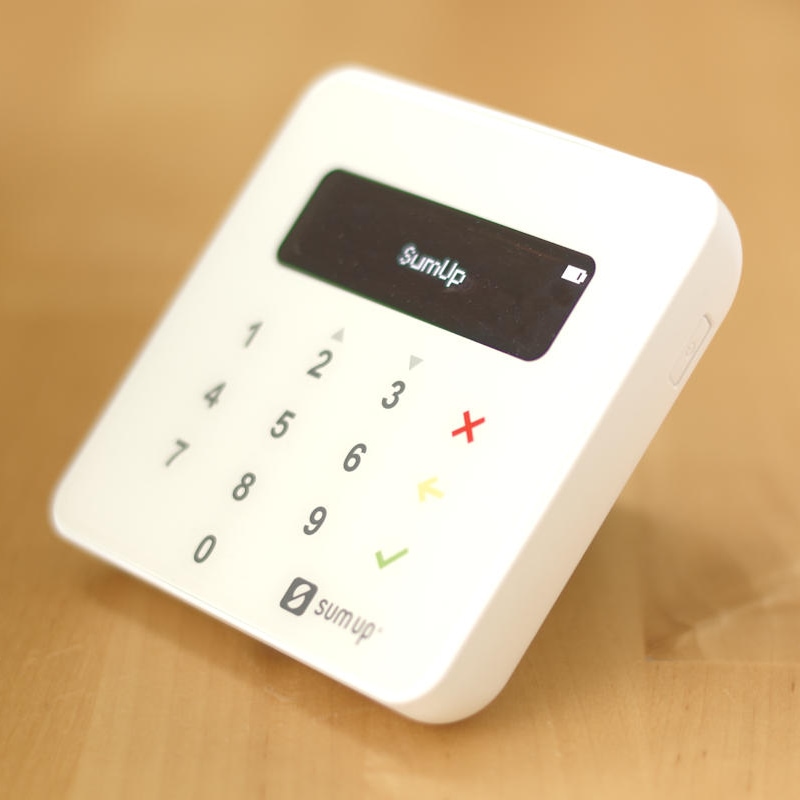
SumUp Air.
EC, Mobile Transaction
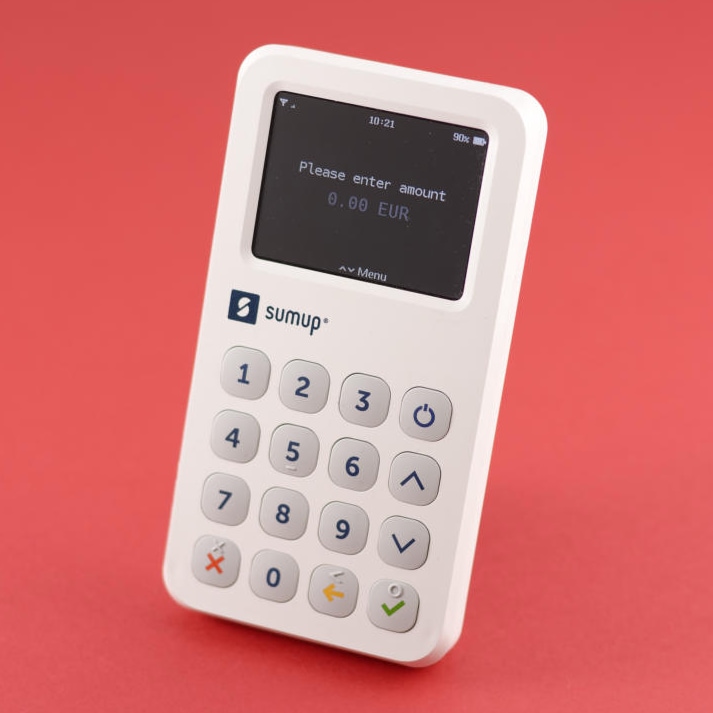
SumUp 3G.
SumUp now also offers a standalone card terminal called SumUp 3G with a built-in SIM card (with unlimited free data) that enables you to process cards over a low network connection such as GPRS and 3G alongside WiFi connectivity. Recently, the company added a printer cradle for it, resulting in the cheapest card machine with receipt printer in the UK.
EC, Mobile Transaction
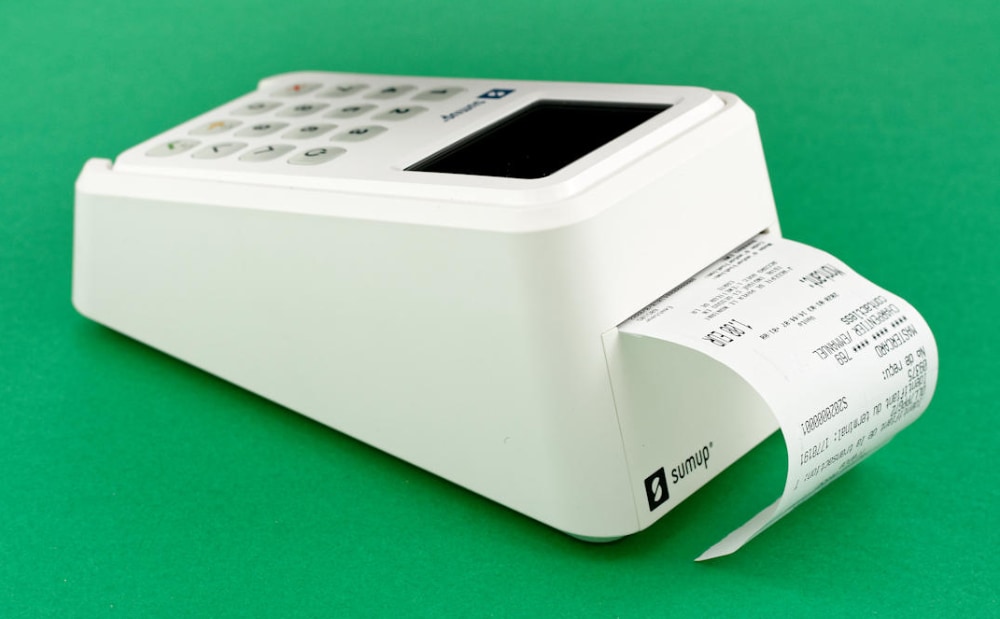
SumUp 3G and Printer set.
In contrast, Worldpay has always taken the traditional approach to card machines. You can’t simply buy a card terminal upfront from them and only pay when you make sales. You’re either borrowing or renting a traditional Ingenico card machine, with 18-month contracts or “pay as you go” plans that still has some monthly or annual costs attached.
Worldpay
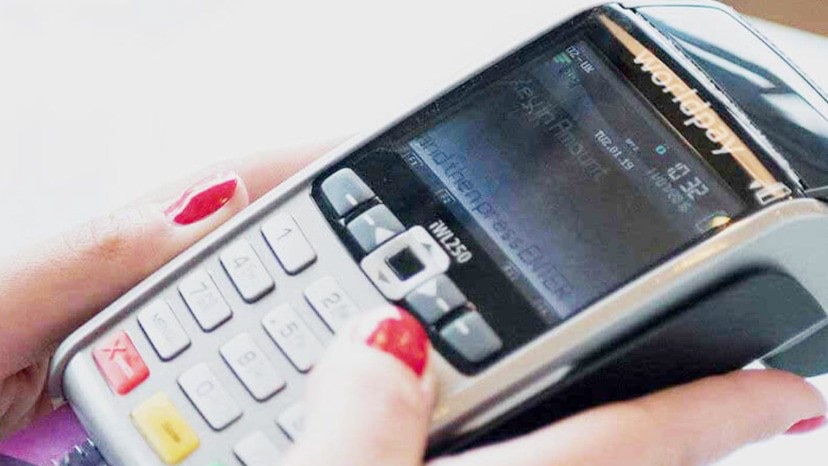
Worldpay portable card machine model.
You can choose between a stationary (works over local internet network), portable (WiFi) or mobile (3G or 4G) Ingenico terminal model. Theses are some of the most ubiquitous card machines in the country, and more advanced than SumUp’s made-for-ease models.
Simplified vs piecemeal costs
There’s a uniformity in SumUp’s costs (or lack thereof) for all merchants, compared to Worldpay’s multitude of fees designed to custom-fit for the size and needs of each business.
Worldpay has a number of plans for their card machines, with “bolt-on” options for customer-not-present (e.g. over-the-phone) payments and integrations. Only one of the plans, Pay As You Go, has no contractual lock-in. The other plans – Simplicity, Fixed Monthly, Custom – require an 18-month contractual commitment where an early termination fee applies if you wish to cancel it prematurely.
SumUp only offers pay-as-you-go pricing without any contractual commitment. There are absolutely no monthly, ongoing fees with SumUp. Worldpay’s contractual plans, however, may incur various monthly costs depending on the package.
| Worldpay contracts |
Worldpay pay-as-you-go |
SumUp | |
|---|---|---|---|
| Lock-in | 18 months | None | None |
| Fee for early termination | Yes, varies | None | None |
| Monthly fees | Yes, varies | Yes, for reports | None |
| Card fees | 0.95%-3.5% + fixed fees | 1.75%-3.5% + fixed fees | 1.69% |
| Terminal purchase* | n/a | £150 setup fee (not purchased) | £22.50 – £129 |
| Terminal rental* | £17.50-£23 /mo | n/a | n/a |
| Monthly min. fee* | £0-£15 | None | None |
| PCI compliance* | £0-£29.99 /yr Non-compliance: £9.99 /mo |
£0-£29.99 /yr Non-compliance: £9.99 /mo |
Free |
*Pricing excluding VAT.
| Worldpay contracts |
Worldpay pay-as- you-go |
SumUp |
|---|---|---|
| Lock-in | ||
| 18 months | None | None |
| Early termination fee | ||
| Yes, varies | None | None |
| Monthly fees | ||
| Yes, varies | Yes, for reports | None |
| Card fees | ||
| 0.95%-3.5% + fixed fees | 1.75%-3.5% + fixed fees | 1.69% |
| Terminal purchase* | ||
| n/a | £150 setup fee (not purchased) | £22.50 – £129 |
| Terminal rental* | ||
| £17.50-£23 /mo | n/a | n/a |
| Monthly minimum charge* | ||
| £0-£15 | None | None |
| PCI compliance* | ||
| £0-£29.99 /yr Non-compliance: £9.99 /mo |
£0-£29.99 /yr Non-compliance: £9.99 /mo |
Free |
*Pricing excluding VAT.
SumUp’s transaction fee is a fixed 1.69%. The SumUp Air reader costs £22.50, and SumUp 3G costs £71 while SumUp 3G and Printer’s price is £129.
Worldpay, on the other hand, sets the transaction rates according to each merchant’s area of business, estimated card turnover and type of card accepted. This means you have to enquire with Worldpay to get an accurate idea of costs. They may add a monthly minimum service charge for those months you don’t make over a specified sales volume.
More on plans: Worldpay card machines – what’s in the different packages?
Worldpay’s stationary, portable and mobile terminals have different monthly rental fees on the Simplicity or Fixed Monthly plans, or an upfront “setup fee” on the Pay As You Go plan. Fixed Monthly gives you a bundled fee that covers card transactions up to a limit plus acquiring and terminal costs. Simplicity is split into the monthly rental cost, and then you pay a card rate for transactions on top of that.
As to PCI compliance (card industry’s security regulations), this is handled for free by SumUp, while Worldpay may charge you for it depending on the plan. In any case, there will be a monthly PCI non-compliance fee with Worldpay if you fail to submit particular documents to verify your security credentials.
Online sales reports are free with SumUp, while Worldpay charges £4.99 + VAT per month to use basic sales reports (the first three months are free).
SumUp best for card readers with POS app
Worldpay has tried to enter the app-based card reader market with a simpler, pay-as-you-go Worldpay Reader. If this is the type of card reader you want, this is not the simplest nor cheapest option, as you see in the table below.
| SumUp Air | Worldpay Reader | |
|---|---|---|
| Price* | £22.50 (offer here) | £69 + purchase fees |
| Setup fee* | None | £150 |
| Lock-in | None | None |
| Monthly fee | None | None |
| Transaction fee | 1.69% | 2.5% + 4p (may vary) |
| Sales reports* | Free | £4.99/mo |
| PCI compliance* | Free | Non-compliance fee: £9.99/mo |
*Excludes VAT
| SumUp Air |
Worldpay Reader |
|---|---|
| Price* | |
| £22.50 (offer here) | £69 + purchase fees |
| Setup fee* | |
| None | £150 |
| Lock-in | |
| None | None |
| Monthly fee | |
| None | None |
| Transaction fee | |
| 1.69% | 2.5% + 4p (may vary) |
| Sales reports* | |
| Free | £4.99/mo |
| PCI compliance* | |
| Free | Non-compliance fee: £9.99/mo |
*Excludes VAT
SumUp Air, on the other hand, makes a clear point of simplifying all their fees. You only pay for the card reader and card transactions accepted, unlike Worldpay that requires PCI non-compliance fees if you haven’t submitted paperwork, a monthly cost for sales reporting tools, and additional purchase fees alongside the card reader price and hefty setup fee.
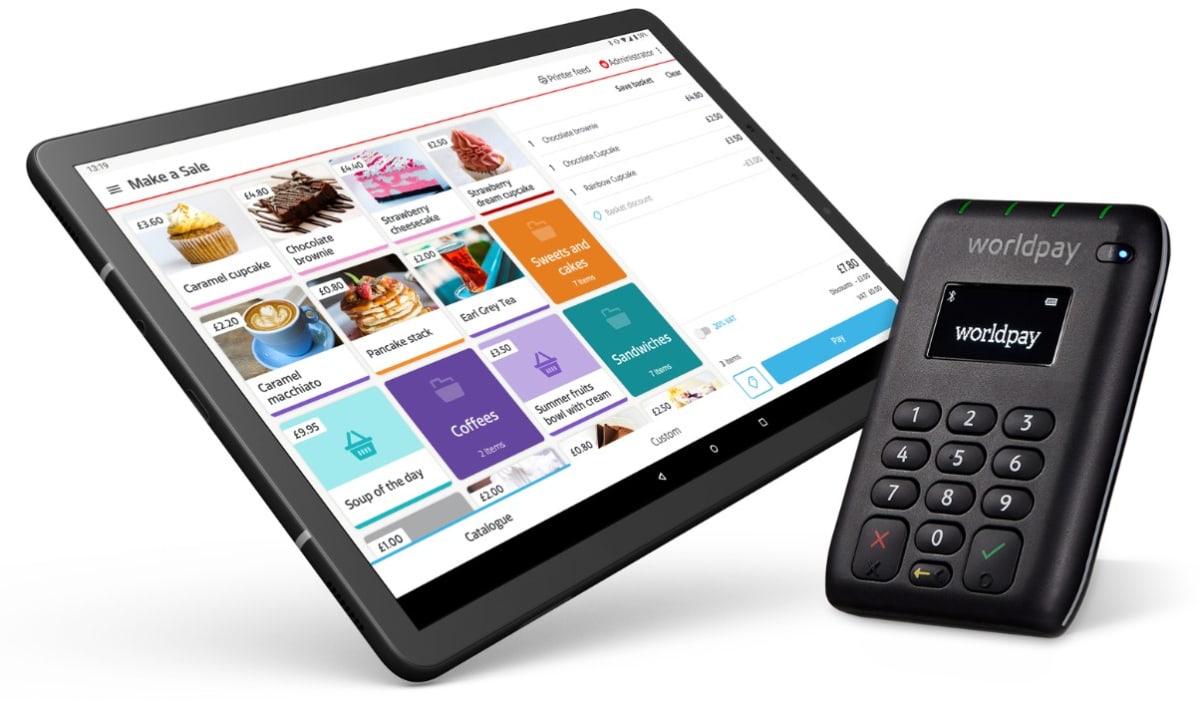
Worldpay Reader with POS app on iPad. Photo: Worldpay
What’s more, it’s not easy to navigate the Worldpay site to find all the costs, so you have to be inquisitive while signing up to ensure there are no other costs.
The transaction rate is a fixed percentage with SumUp. Worldpay determines your transaction rate based on expected sales volume, or gives you a fixed rate like the one in the above table.
SumUp accepts more cards without a contract
As well as offering card machines packages and integrated payment solutions, Worldpay is an ‘acquirer’, meaning that merchants get their own merchant account with card acceptance agreements attached.
A downside is that Amex acceptance has to have a separate merchant account with American Express directly, if you want to accept that. This is a typical requirement from Amex, which you’ll see mentioned by other merchant service providers.
 |
 |
|---|---|
| Accepted without extra contract | |
| Requires additional contract | |
| n/a | |
With SumUp, you don’t get your own merchant account. Instead, all transactions go through a collective merchant account that SumUp uses securely for multiple sellers.
This takes the burden of contracts out of your hands, and it means that Amex acceptance is handled by SumUp without your having to set up an extra agreement. Simply put, you accept all cards without any paperwork to ensure this.
We should also add that settlement in your bank account takes 1-3 working days with Worldpay. SumUp’s payouts takes the same amount of time, but the new SumUp Card (prepaid Mastercard) gives you access to transactions the day after, even on weekends.
Both work with POS, but payments are focus
When it comes to the point of sale (POS), the two companies have some similarities. Worldpay’s focus is card payments, not POS software. SumUp also focuses on getting paid, with not too many POS features to get in the way. In both cases, till features feel secondary, but there are different reasons for that.
Worldpay doesn’t focus on POS software because the company doesn’t have to. Their card machines are made to be integrated (if not used on their own) with external POS systems, letting Worldpay focus on what they’re best at: card processing. This way, any size business can tailor their payments and tills to exactly what they want.
That said, merchants who want an all-in-one type solution can use Worldpay’s POS app on Android or Apple devices, but the software only works with Worldpay Reader and is not that advanced.
SumUp
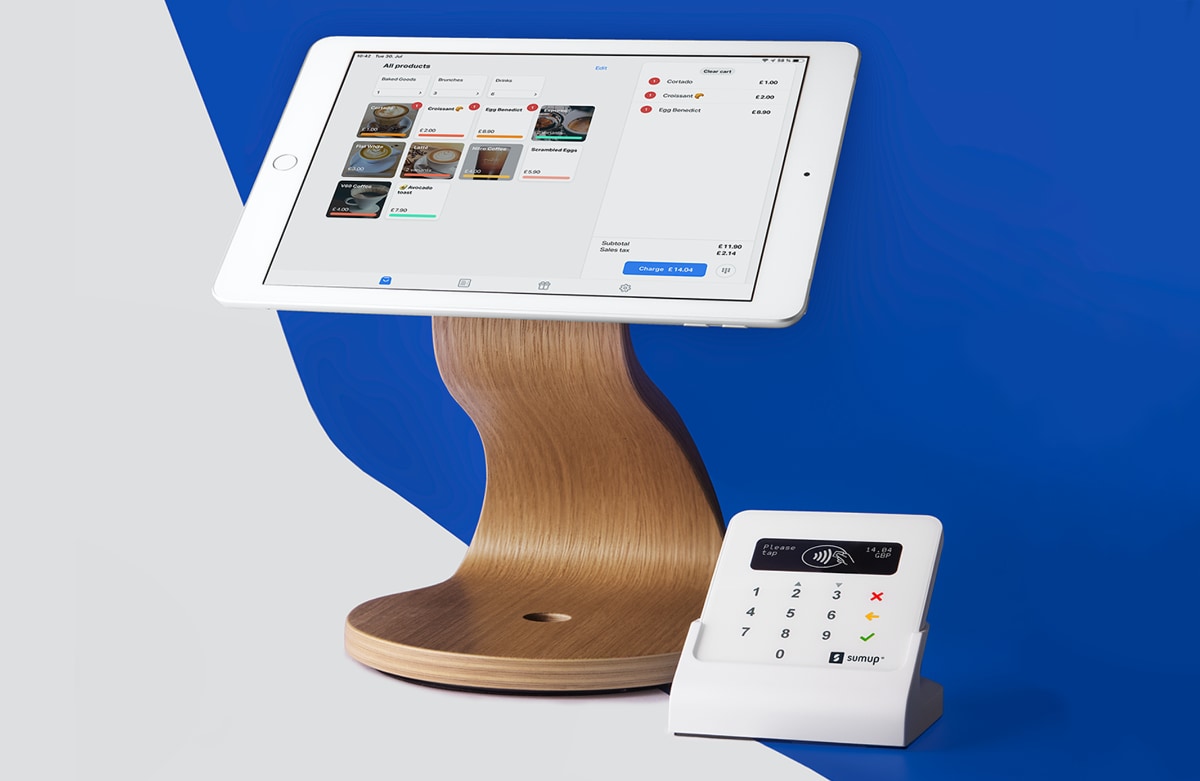
SumUp Air is used with a POS app, here seen with iPad and wooden SumUp Stand.
SumUp’s payment app is similar to the Worldpay app and compatible with iPhone, iPad and Android tablets or phones. It has a product library, transaction history, can refund payments, accept cash, and more. Moreover, it can connect with a receipt printer, cash drawer and barcode scanner as needed.
However, SumUp’s app features are limited in order to simplify payments for small businesses that may not need an advanced POS system. If SumUp merchants want more tailored or advanced features like inventory management, there are other POS systems you can integrate with. SumUp only shares details of these options if you contact them.
Worldpay offers more advanced remote payments
Versatility and a full range of payment features are central parts of Worldpay. Not only is the company well-versed in serving brick-and-mortar businesses – there is also a good range of options for remote payments, including:
- Virtual terminal: manually enter card information on a secure web page to accept phone or mail order sales
- Invoicing: send email invoices
- Payment links: accept payments from customers online or through messages
- Ecommerce: integrate Worldpay’s payment gateway on your website for a fully functioning online store
All of these incur monthly fees and higher transaction costs, which is normal for remote payments.
SumUp has a virtual terminal for no monthly fee and 2.95% + 25p per transaction, but only eligible businesses who request it can access it. Every SumUp user automatically has access to invoicing, Mobile Payments (QR codes, SMS payments, payment links), and an Online Store Starter for no monthly fees and 2.5% per transaction. All of these are basic in their features, but good value considering the lack of monthly charges.

With a virtual terminal, you can enter payments on a computer.
Essential reporting free with SumUp
You’d think that essential reporting functions would come free in a Worldpay contract, but that’s not the case. In order to export transactions and analyse sales data, you have to subscribe to a paid membership for sales reports. Otherwise, you will be on a free ‘Lite Membership’, which gives you a basic view of fees and sales in the browser-based Worldpay Dashboard.
SumUp doesn’t have any costs associated with sales reports. You can sort sales into custom time periods, employees, transaction status and more. Transactions, sales summaries, revenue and payout reports can be exported to a file (CSV, PDF or XLS depending on the type) to use in e.g. accounting software. Payout reports are also shown in a separate section of the online SumUp Dashboard.
24/7 customer support with Worldpay
An advantage of Worldpay is their round-the-clock phone support for all customers. If your card machine breaks down, you also get next-day replacement for a fee. There is a help section online, but it is limited how much information you can get from there, so it’s better to contact Worldpay directly if you need help.
SumUp doesn’t have the same level of support – in fact, you can only call their customer service team on weekdays between 8am and 7pm and weekends between 8am and 5pm.
Worldpay doesn’t give everything away upfront – not until they have your contact details and you make sure to ask about all the terms and possible fees.
In between, you can email them, but non-urgent queries can take over a week to get a response for. Urgent issues are best dealt with on the phone, but most non-urgent issues may be dealt with by browsing through SumUp comprehensive online Support Centre.
You only need a short look at SumUp’s website to see everything you should know about being a customer. Worldpay, in contrast, doesn’t give everything away upfront – not until they have your contact details and you make sure to ask about all the terms and possible fees.
Getting started
It’s pretty easy to set up an account with SumUp – just go to their website and fill in a short online form with details of your business, personal information and bank account details so you can receive payouts.
Then you order a card terminal, which takes up to a week to receive by post, during which is takes a few days to get your bank account verified by SumUp. Most likely, you don’t have to submit documents to prove your identity or business, as the verification process is automatic and not dependent on a phone or video call.
Worldpay takes a more traditional approach to applications. The company wants you to get on a sales call with them, but it is also possible to fill in an online application form, during which you receive exact quotes for the chosen card machine and plan (which first requires your contact details, so Worldpay can call you soon after).
Our verdict
If you’re a small business that doesn’t want to commit to a long-term contract with ongoing fees (as a new or growing startup, do you even know where you are in a year’s time?), SumUp is a dependable, low-cost choice.
You can buy one of their card terminals, not use it for ages, and not be charged or chased up for inactivity. This makes SumUp a great choice for seasonal or cash-strapped business, and perfect for unpredictable sales. If you want till functionality, but are worried about usability, the SumUp app caters exactly for that.
Worldpay is best for businesses of any size that want to tailor their tills and payment options. The ongoing costs suit a stable turnover, particularly when you can negotiate transaction rates based on knowledge of your previous sales.
While SumUp would largely leave you alone with your payments, Worldpay is better for personal contact. Applying for a payment solution, getting help and dealing with contracts require talking to their team, whether that’s day or night. If this kind of relationship is essential to you, Worldpay would fit the bill.

